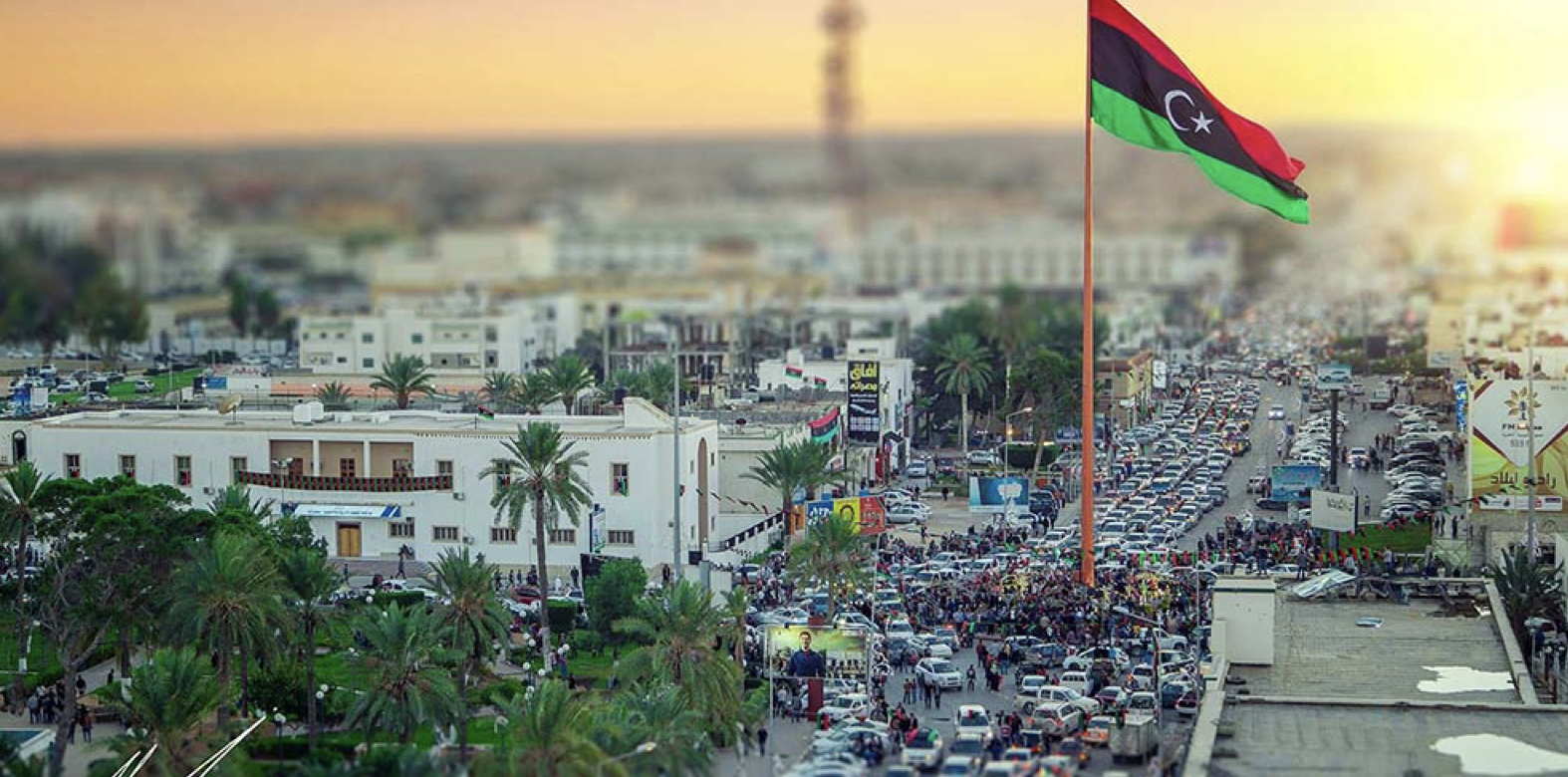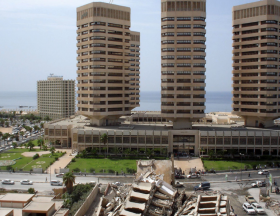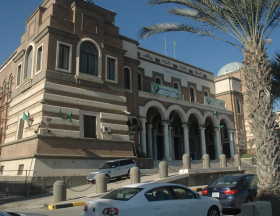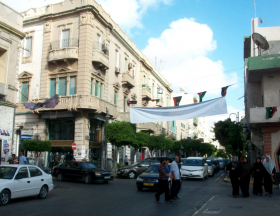A meeting full of paradoxes and which can be described as historic, the one which brought together the former Libyan Minister of the Interior, Fathi Bachagha with the retired general, Khalifa Haftar, in the city of Benghazi (east). They were joined by five other candidates in an effort to coordinate the post-election phase.
Known as the strongman in the western part of the country, Bachagha praised Haftar, who in turn is known to be the strongman in the eastern part of the country. Each of the two men had engaged in a frontal attack and a violent fight against the other in the city of Tripoli and the surrounding areas, in 2014-2015 and then in 2019 and 2020.
This prompts observers to question the secrecy that brought the two men together for the first time since 2014, three days before a presidential election, which was officially postponed, on Wednesday, December 22.
Elections postponed. What are the scenarios?
The answer to this question came from the mouth of Abdelmajid Seif Ennasr, one of the main presidential candidates who attended the meeting in Benghazi.
Seif Ennasr said in a statement issued after the meeting that “the mandate of all current bodies ends on December 24, in accordance with the political road map.”
He also stressed “do not accept any procrastination or extension of this period, in any form whatsoever.”
By current body, it is not the Chamber of Deputies subject to Haftar or even the High Council of State (Legislative Consultative) but rather the Government of National Union chaired by Abdelhamid Dbeibeh and the Presidential Council headed by Mohamed Manfi .
The main objective of Bachagha’s meeting with Haftar is to prepare for the post-December 24 phase, through the formation of a new government that will not be chaired by Dbeibeh of course, as well as the development of a roadmap of next presidential and legislative elections.
Bachagha spoke in a previously released video recording of the legitimacy of the Union government which he said would end on December 24 at 12:30 a.m.
In other words, the “policymakers and those who pull the strings” (Haftar and Bachagha) will not agree to any extension of the mandate of the Government of National Unity for even a minute longer.
What is remarkable about this meeting is the absence of the presidential candidate, Aguila Salah, the speaker of the Chamber of Deputies, who acted as political mediator between Haftar and Bachagha.
However, it seems that things have evolved rapidly to such an extent that the meeting was not secret or telephone but face-to-face and in full view of all, which reflects the importance of this coordination which could evolve into an alliance, given the power of the opponent they face (Dbeibeh).
Bachagha had already run for President of the government before losing to Dbeibeh. His name is circulating as president of the next government if current efforts succeed in removing the current head of government.
In return, Haftar’s name is circulating to lead the Presidential Council or at least grant him the prerogative to choose the name of the next Minister of Defense, which will allow him to strengthen his military influence in the western region this time around, to consolidate his militias, both financially and militarily, and to shield his legal file against the complaints filed against him in the United States of America, being accused of having committed war crimes.
Bachagha resorts to Cairo
Bachagha did not just meet Haftar and the other candidates (Seif Ennasr, Ahmed M’atig, Mohame Montacer, Aref Nayedh, Cherif Wafi) but flew to Cairo to meet the head of the Egyptian intelligence services, Abbes Kamel, in an attempt to mobilize regional and international support for his yet to be announced plan for the phase that will follow on December 24.
The meeting between Bachagha and Abbes Kamel comes the day after the audience granted in Cairo by Egyptian President Abdelfattah al-Sisi to the President of the Libyan Presidential Council, Mohamed Manfi.
The Egyptian regime is working to secure its interests in Libya by facilitating the alliance between Haftar and the strongman of Misrata (Bachagha). Egypt has come to believe that its ally in eastern Libya will only be able to dominate Libya by allying itself with militias in Misrata to isolate the Islamists and get rid of Dbeibeh, who is seen by many observers, as being closer to Turkey than to Egypt.
However, Dbeibeh runs the risk in approaching Haftar of losing his popularity and influence in the western region of the country, in particular, in his hometown, Misrata, and with his powerful armed militias.
This was revealed by one of the leaders of the Misrata militias, Taher Ben Gharbiya, in a statement made to the private Libyan television station Panorama.
“The militias of Misrata, the notables, the Military Council, the sons and mothers of martyrs … we have all been unanimous in showing our rejection of any contact with the criminal Khalifa Haftar,” he said.
Dbeibeh is reshaping its alliances
To an extent that reflects his predisposition to face his opponents who want his downfall, Dbeibeh on Wednesday recovered his post of Head of Government, after having transferred, temporarily, his functions to Vice-President Romdhane Bounjeh, following the announcement by the Chamber of Deputies of the postponement of the elections.
Dbeibeh was adamant in launching: “I will not let Libya get bogged down in the absurd once again, and I will continue to shoulder the responsibilities that are mine for the homeland and I know for a fact that conspiracies are taking place. to be hatched against me ”.
This means that a “political” clash will pit Dbeibeh on the one hand against Bachagha, Haftar and the Chamber of Deputies on the other. This political clash could evolve into military clashes in Tripoli if the various protagonists do not reach any agreement.
Along with the photo illustrating the handshake between Bachagha and Haftar in Benghazi, another photo has spread on social networks showing Dbeibeh with Méchri in the company of Mohamed Guenounou, spokesperson for the operation “Volcano of wrath” who defeated Haftar’s militias in the attack on Tripoli.
This photo was taken on December 20, on the sidelines of the celebration of the fifth anniversary of the liberation of the city of Sirte (450 km east of Tripoli) from the grip of the terrorist organization Daesh.
Noteworthy is Guenounou’s return to media appearances after being banned by the Presidential Council, the army’s commander-in-chief, from making statements to local media since last April.
Guenounoun’s return to the scene emerges a sort of message to the Haftar militias that any military movement in the direction of Tripoli will be thwarted by a return to the front lines of militias affiliated with Operation Volcano of Wrath.
This photo reflects a new alliance which begins to take shape between Dbeibeh (executive power) and the president of the High Council of State (legislative power) and the operation “Volcano of the wrath” (military power) to face the alliance that can be formed and formalized between Bachagha, Haftar and the presidency of the Chamber of Deputies.
At a time when the deputies loyal to Haftar and Bachagha wish to dismiss Dbeibeh, the latter is immunized by the support of the High Council of State as a partner of the Chamber of Deputies, and its consultation for the choice of the Head of Government is “binding” in accordance with the Political Agreement.
If Hafatr’s militias decide to coordinate with the phalanxes and security services loyal to Bachagha and use force to depose Dbeibeh, the latter could count on most of the militias from Misrata and the Western Zone who have resisted the attack. Haftar attack in 2019.
Maintaining each of the two parties in their positions will be likely to re-edit the landscape of the split and reignite the crisis of legitimacy, which could cause the country to enter a new transitional phase and move it away, for many months. , of the deadline for the elections, instead of a postponement of one month according to the suggestion made by the Electoral Commission
Source Analysis by Anadolu Agency











Réagissez à cet article